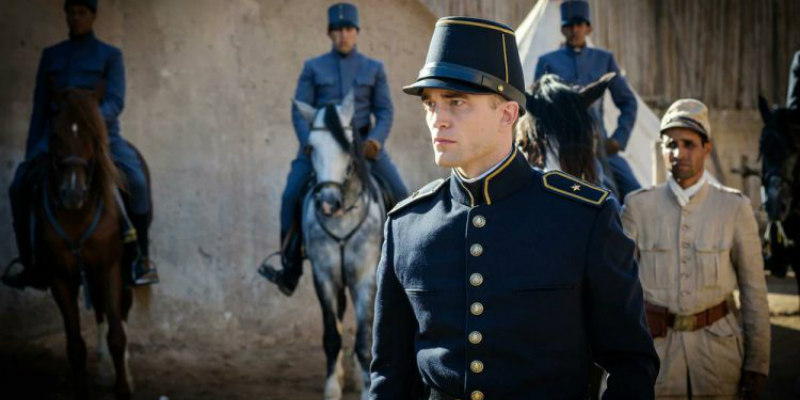
The Magistrate of an imperial outpost questions his role upon the arrival
of a cruel-minded Colonel.
Review by
Benjamin Poole
Directed by: Ciro Guerra
Starring: Mark Rylance, Johnny Depp, Robert Pattinson, Gana
Bayarsaikhan, Greta Scacchi

Anyone fancy a worthy two hour colonial drama featuring The Actor
Mark Rylance and professional face puller Johnny Depp which is
based upon a book by J.M. ‘Jim’ Coetze, a writer who is Taken Very
Seriously? Thought not, but here we are. Set in an unspecified time during
the early twentieth century in an unspecified Eastern location, Sir Mark
Rylance plays the unnamed magistrate of an Empire outpost. The Magistrate is
a gentle enough soul and a thoughtful and kind administrator of the town,
which is peaceful and productive. Troubles begin when Colonel Joll (Depp)
rocks up to the outpost. Joll is a right old prick, whose sole character
definition is to cause division and brutality. He jails an old man and his
sick nephew on jumped up charges of sheep stealing, with ulterior designs to
aggravate the "barbarian" populace of the desert (viz, the indigenous
people) into war. The Magistrate is understandably nonplussed by Joll's
antics, and thus begins the Manichean discourse of
Waiting for the Barbarians.


Presumably, the rationale behind Waiting for the Barbarians' indeterminate loci is to generalise the situation: this could have been anywhere during the Empire's brutal reign, with the cruelty depicted suggesting a common factor across imperialised territory. However, this approach causes the film's first problem, in that the mise-en-scene - donkeys, dust, a bazaar of braced blankets - reduces the scenery to cliché, reinforcing the sort of lazy similitude the western mind conjures when this territory is mooted (think Raiders of the Lost Ark et al). For a film that has pretensions towards making dramatic mileage out of actual historical atrocity, the ambivalent approach almost immediately sequesters the events of the film within the realm of fable.
[ READ MORE: New Release Review - She is Love ]
Depp at least seems attuned to Waiting for the Barbarian's resultant hyperbole and offers his usual pantomime execution. The small consolation of a Depp performance is giggling at the outlandish props he hides behind/utilises for his presentation: here it is an unlikely pair of sunglasses and a severe haircut which conspire to make him resemble none other than Major Arnold Toht (Raiders... again! Hmmm). Depp remains the most mannered actor continuing to get major work today, and his presence here is the same old energy (one can't help feeling bad slagging off someone who seems such a decent lad: those YouTube videos of him dressed as Jack Sparrow visiting kids in hospital! But that's part of the problem: whenever you watch him you cannot help but think of Depp the person, rather than whatever character he's essaying).

As stated earlier, Rylance is An Actor and he Acts throughout The Film. A dead giveaway of theatrical types featuring in movies is the delivery, where...WORDS...are ENUNCIATED...slowly but DELIBERATELY for the... cheap SEATS. Movie acting and theatrical performance are crucially different disciplines, but I think directors are too intimidated by the former artistic director of The Globe (and a man who actually had sex on camera once, fair play) to let Rylance know. And so...everyTHING...takes... TWICE...as LONG...to say... than it normally WOULD - to the extent that you wonder if the film is even playing at the correct speed.
[ READ MORE: New Release Review - The Whale ]
Joll causes upset in the outpost and moves on after imprisoning elderly
"barbarians" as POWs. The Magistrate releases them and, months later, comes
across a rather comely beggar woman. The woman (referred to in the credits
as "the girl" and played by supermodel Gana Bayarsaikhan) is scarred
about the eyes and has broken ankles. There begins a weird so-so love story
with The Magistrate taking in the winsome vagrant. He tends to her, and
makes sympathetic noises, and bathes her broken and bloody feet. At one
point he passes out doing this, presumably in a sensual faint, but possibly
because of the smell. It is odd that the ostensibly kindly Magistrate hasn't
taken in any other of the less attractive or male beggars, but then it is
rich white men who are the choosers in this outpost. The Magistrate,
however, does resolve to do the decent thing. He bundles up the girl on his
horse and, braving the sandstorms of the desert, attempts to return her to
her family. Problem is that when The Magistrate gets back to the fort, he
discovers that Joll's oppo (played by Robert Pattinson, who is as
great as ever, given ample opportunity to indulge that silvery mean streak
which galvanises his style) has placed himself in charge, which leads to
further tensions within and without the outpost...


For a movie filmed in south east Morocco, the Hollywood of Africa, Waiting for the Barbarians has no epic sweep, and is instead rather insular. Likewise, the potential complexities of the source novel (which are given scant lip service by the awesome Greta Scacchi, who turns up in a minor house help role) are comfortingly simplified here, too. There is a persistent strain of literature, typified by Coetze, which centralises the privileged white man, creating poetry from the anxieties and experiences of this potential saviour, whom such books assume to be central to any given culture. Waiting for the Barbarians is a perfunctory adaptation of this sort of fare, with little to contribute apart from the evident platitude that the subjugation of a people is probably a bad thing. It is ironic then that Waiting for the Barbarians marginalises the so-called savages of its title, preferring instead to focus on the broad play of its stars.

Waiting for the Barbarians is on
Prime Video UK now.
